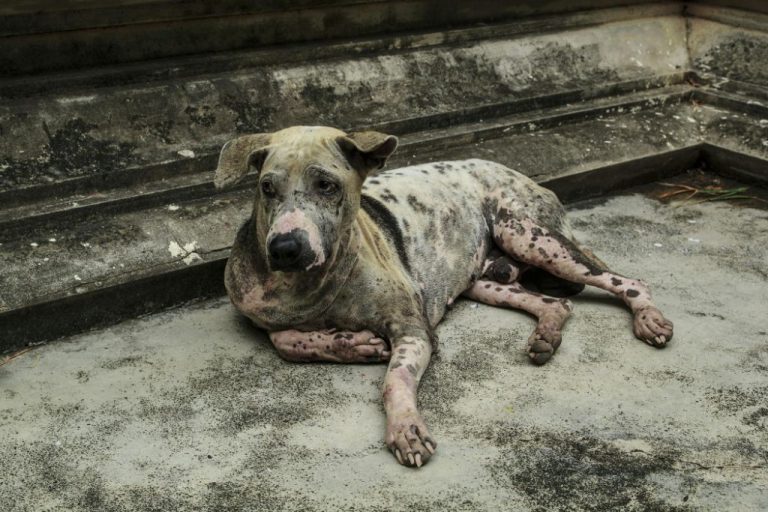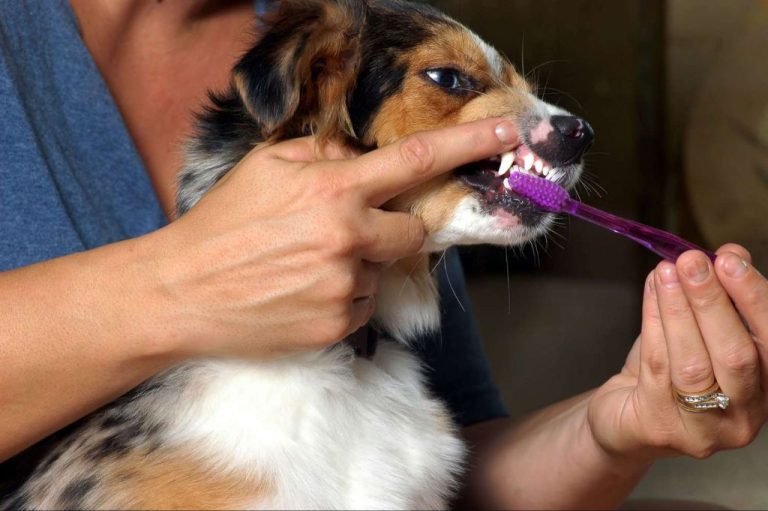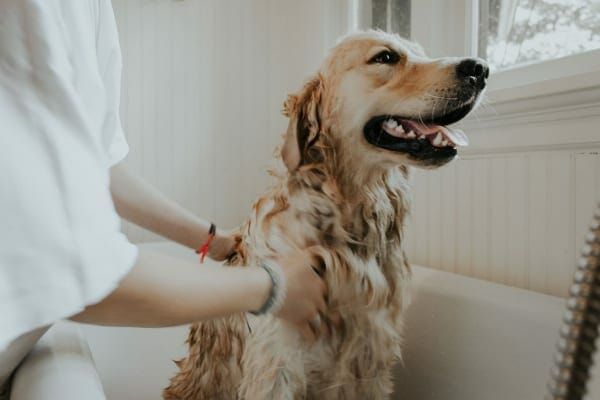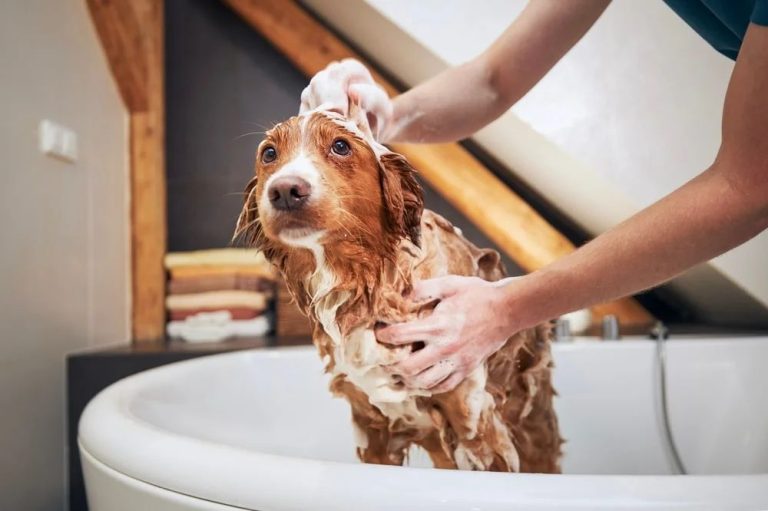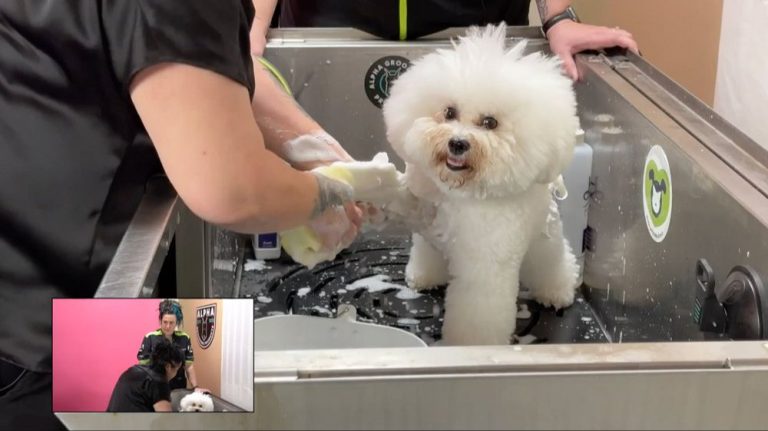Dealing With Skunk Odor: Effective Home Remedies For Your Dog
It’s a rite of passage for many dog owners – that fateful moment when your beloved pooch wanders a little too close to a lurking skunk. One startled yelp later and your dog comes running back reeking of that infamous sulfurous stench. As gag-inducing as it is, nothing can quite prepare you for the full sensory assault of a skunked dog. The odor permeates their fur and lingers for days, filling your home with an eye-watering, nausea-inducing funk. Even after multiple baths, traces of the smell continue to waft up unexpectedly. Dealing with a skunk sprayed dog often feels akin to an olfactory endurance test. Most dog owners search out ways to quickly and safely de-skunk their pet and home. Understanding the right strategies and tools can help you neutralize skunk odor fast so you and your dog can breathe easy again.
What Causes Skunk Odor on Dogs
Skunks release a smelly chemical spray as a defense mechanism when they feel threatened. According to VCA Animal Hospitals (https://vcahospitals.com/know-your-pet/skunk-spray-and-your-dog), this defensive spray is emitted from glands near the base of the skunk’s tail. The main smelly chemical in skunk spray is thiols, which have a powerful, pungent odor that can be detected even in tiny amounts.
When skunk spray gets on a dog’s fur and skin, the thiols bind to hair proteins creating an unpleasant odor that can linger for weeks or even months. The oily secretion is difficult to fully remove from a dog’s coat, which is why the smell persists. Getting skunk spray in a dog’s eyes or mouth can also be dangerous, potentially causing inflammation and eye ulcers (https://www.vet.cornell.edu/departments/riney-canine-health-center/canine-health-information/what-do-when-your-dog-gets-skunked).
Overall, skunk spray causes an unbearable stench on dogs due to the thiols binding to fur and the oily nature of the secretion. Proper cleaning methods are needed to break down the oils and remove the odor.
Dangers of Skunk Odor for Dogs
Skunk spray contains several toxic chemicals including thiols, such as
mercaptans, and sulfur compounds. Direct exposure to the eyes and mucus membranes
can cause severe irritation, pain, and temporary blindness (1). If ingested, skunk
spray can have toxic effects on dogs, causing nausea, vomiting, and diarrhea (2).
The sulfur compounds in skunk spray are toxic when ingested in high quantities. They
can disrupt red blood cells, causing them to burst, leading to anemia and jaundice.
In severe cases, dogs may go into shock or die after ingesting skunk spray (2). The toxins
also irritate the skin. Direct contact can result in chemical burns and blistering. The
eyes are especially sensitive, and exposure can lead to conjunctivitis (1).
These toxic effects are most concerning when the spray gets directly into a dog’s
eyes, nose, or mouth, or if the dog licks its fur before the spray is washed off.
Mild exposure typically results in irritation and bad odor. However, in rare cases,
toxic shock syndrome from ingesting or inhaling large quantities of spray could be deadly (2).
Sources:
(1) https://vcahospitals.com/know-your-pet/skunk-spray-and-your-dog
(2) https://www.skedaddlewildlife.com/location/rexdale/blog/how-dangerous-skunk-spray-to-dogs/
Home Remedies to Remove Skunk Smell
There are several household ingredients that can help eliminate skunk odor from dogs. Some of the most effective home remedies include:
Tomato Juice
Tomato juice is a traditional home remedy for skunk odor. The acidic tomato juice helps neutralize the thiols in the skunk spray. To use this remedy:
- Pour 1-2 large cans of tomato juice over your dog in an outdoor area or bathtub.
- Allow the tomato juice to soak into your dog’s coat for 5-10 minutes.
- Rinse thoroughly with water.
- Repeat as needed until the skunk smell dissipates.
While tomato juice can help, it may take several applications to fully eliminate the odor.
Hydrogen Peroxide Mix
A mixture of hydrogen peroxide, baking soda, and dish soap is one of the most effective remedies for skunk odor. Hydrogen peroxide neutralizes the thiols, while baking soda deodorizes. To make this remedy:
- Mix 1 quart of 3% hydrogen peroxide, 1/4 cup baking soda, and 1 teaspoon liquid dish soap in a bucket.
- Carefully pour the mixture over your dog’s coat while avoiding the eyes and mouth.
- Let sit for 5 minutes before thoroughly rinsing with water.
- Dry your dog with towels.
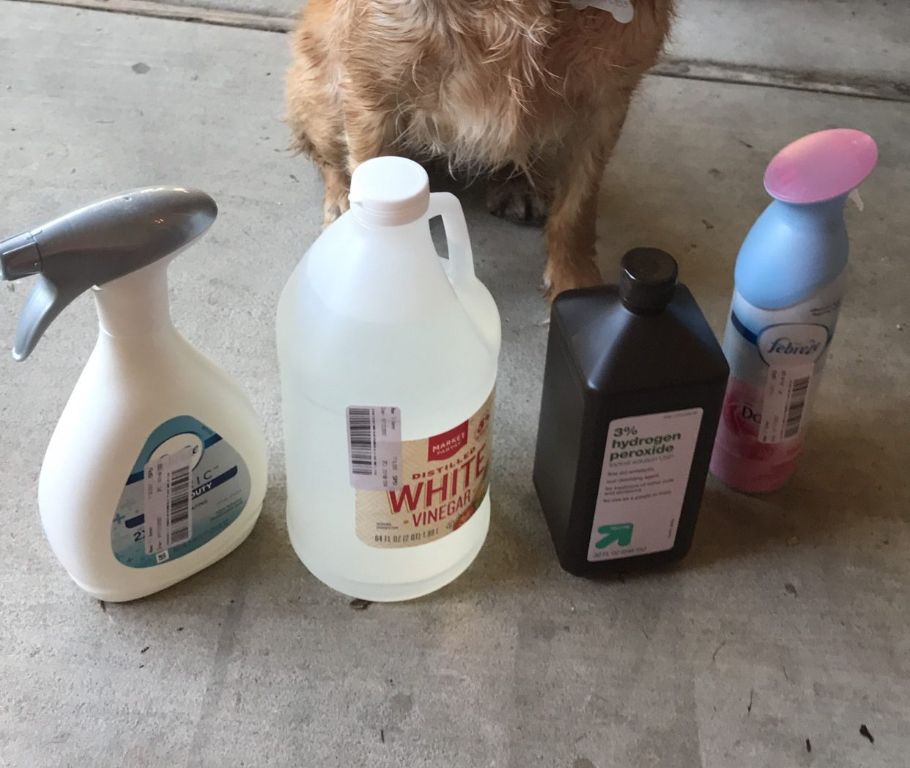
This hydrogen peroxide remedy often removes skunk odor after just one application.
Baking Soda Paste
For localized skunk spray on your dog, making a thick baking soda paste can help neutralize and absorb the odor. To make a paste:
- Add just enough water to baking soda to form a thick paste.
- Gently rub the paste onto affected areas of your dog’s fur.
- Let sit for 5 minutes before rinsing.
Baking soda is a natural deodorizer and can be used along with other remedies.
Store-Bought Skunk Odor Removers
There are several effective commercial products available to help remove skunk odor from dogs. Some popular options include:
Bodhi Dog Pet Deskunk Spray – This natural spray uses essential oils like lemon and clove to neutralize skunk smells on dogs, cats, furniture, carpets, and more (source). It’s non-toxic and safe if licked or ingested.
Nature’s Miracle Skunk Odor Remover – This enzyme-based formula breaks down skunk thiols and eliminates odor on contact. It’s safe for use on dogs, puppies, furnishings, and in the yard (source).
Out! PetCare Skunk Odor Remover – This remover uses oxy-ionic technology to oxidize and eliminate skunk smells on contact. It’s safe for dogs, puppies, cats, and kittens (source).
Follow product instructions carefully and patch test carpets or surfaces before use. Store-bought removers can provide powerful odor elimination when used properly.
When to Call the Vet
Skunk spray contains toxic chemicals like thiols that can be absorbed through a dog’s skin and cause illness. You should call your vet immediately if your dog displays any concerning symptoms after being sprayed by a skunk. These include:
– Excessive drooling or foaming at the mouth. Skunk spray can cause salivation and nausea in dogs when inhaled or absorbed through mucous membranes. Foaming at the mouth may signal a toxic reaction. (vcahospitals.com)
– Lethargy or weakness. Skunk spray can act as a neurotoxin, especially if inhaled, causing lethargy or muscle tremors. Seek immediate veterinary care if your dog seems abnormally weak or tired after being skunked. (vet.cornell.edu)
– Red, irritated eyes. The oils in skunk spray can irritate a dog’s eyes. Check for any redness or swelling after exposure and see your vet if irritation persists. (oldtownevetclinic.com)
Preventing Skunk Spray Incidents
Prevention is the best defense against skunk spray encounters. Here are some tips for keeping skunks away from your home and dogs:
- Avoid areas where skunks are known to live and congregate, like woodpiles, sheds, under porches, and unsealed foundation openings. Keep dogs leashed in these high-risk areas.
- Make sure your yard is well-fenced and secured. Check for any openings along the bottom or under gates where a skunk could get in.
- Install motion-activated lights around the perimeter of your yard. The sudden light will startle skunks.
- Keep your yard and surrounding areas tidy. Remove brush piles, dense vegetation, and food debris that may attract skunks.
- Train your dog to come immediately when called, even if they are focused on something interesting like a skunk. Practice recall training daily.
- Consider installing an underground electronic fence that uses a tone and safe stimulation to deter your dog from approaching the perimeter. This can keep dogs safely in the yard.
- Never let dogs out at night off-leash if skunks are in your area.
Taking proactive measures will go a long way towards preventing that dreaded skunk spray encounter. Be vigilant about keeping skunk dens and attractions away from your property. And train your dogs to avoid skunks and come when called.
Dealing with Lingering Odor
Even after using effective skunk odor removal methods, some smell may still linger, especially in your dog’s fur and bedding. Here are some tips for dealing with any lingering skunk odor:
Wash all of your dog’s bedding, including beds, blankets, pillows, and soft toys, in hot water mixed with an enzymatic cleaner or baking soda and vinegar. The heat will help break down odor molecules faster (1). Let all fabric items air dry outside if possible.
Give your dog a deep cleaning bath using an odor eliminating shampoo. Let the shampoo soak for 5-10 minutes before rinsing to allow it to fully penetrate and neutralize odor. Pay extra attention to cleaning the fur around your dog’s face, since this area is hardest to clean initially after a skunk spraying. Using a damp washcloth, you can also spot clean areas that still smell.
Brush your dog’s fur thoroughly with a slicker brush or undercoat rake to remove any remaining dried skunk spray trapped deep in the coat. This will also distribute the shampoo and help freshen their scent.
Consider taking your dog to a professional groomer if the smell persists. Groomers have commercial-grade cleaners and can fully bathe, dry, and brush out your dog’s coat to eliminate lingering odors.
With diligent washing and airing out of fabric items, the lingering skunk smell should dissipate within a few days (2). Avoid punishing or scolding your dog for the skunk encounter – they are likely just as upset about the smelly incident as you are!
(1) https://www.akc.org/expert-advice/health/what-to-do-when-your-dog-gets-sprayed-by-a-skunk/
(2) https://www.humanesociety.org/resources/de-skunking-your-dog
Teaching Dogs to Avoid Skunks
Since skunks usually spray when they feel threatened, it’s important to train your dog not to chase or corner them. Here are some tips for teaching your dog to avoid skunks:
Use positive reinforcement – When you see your dog ignoring a skunk, reward them with treats and praise. This will reinforce the behavior you want.
Work on obedience training – A dog that understands commands like “leave it” and “come” is less likely to chase skunks. Practice these commands in safe settings first.
Keep your dog leashed when outdoors – This will give you control if your dog tries to chase a skunk. Use a long lead so they still have some freedom to explore.
Use correction/deterrent tools – Citronella spray collars, ultrasonic devices, or pepper spray can deter your dog from approaching skunks.
Block access to known dens – If there are areas around your home where skunks live, block them off so your dog can’t investigate the den.
Desensitize your dog – From a distance, reward calm behavior when your dog sees a skunk, gradually getting closer. This teaches them skunks aren’t a big threat.
Patience and consistency are key when training a dog to avoid skunks. Don’t give up if they get sprayed again. With time, most dogs will learn skunks are best left alone.
Conclusion
Dealing with skunk odor on your dog can be stressful and frustrating. But there are effective home remedies you can try to remove the smell before it becomes overwhelming. The most popular methods are combinations of hydrogen peroxide, baking soda, and dish soap. Simply mixing these household ingredients and applying the paste to your dog’s fur can help neutralize those volatile skunk thiols.
Remember to avoid your dog’s eyes, nose and mouth when applying any cleaning solutions. And never use bleach or harsh chemicals that could further irritate the skin. If the smell persists after multiple washings, call your veterinarian for stronger odor-removal products. They may also check for eye injuries or other health effects from the skunk spray.
The key is acting quickly once your dog gets sprayed to limit absorption of the oils into the fur and skin. Keep your dog away from brush and den areas where skunks live. And be ready with effective homemade skunk odor removers, so you can get your pup smelling fresh again.

